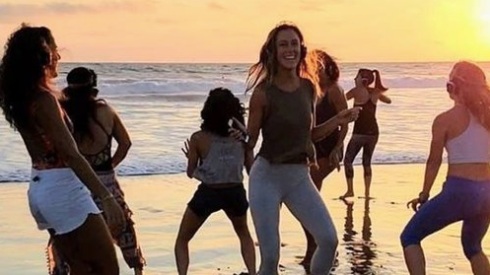Creative Movement Connects Body, Mind and Spirit
Most are familiar with the performance or competitive dance world of learned steps. Conscious dance is a non-competitive, body-based way of raising consciousness. There’s no wrong way to move and your shape and measurements don’t matter,” says Mark Metz, of Berkley, California, founder and executive director of the Dance First Association (DFA) and publisher of the Conscious Dancer Magazine and UpShift Guide.
The group identifies more than 100 forms of conscious dance, ranging from ecstatic dance to somatic movement therapy. Commonalities include body awareness, barefoot movement, inspiring global music and minimal structure facilitated by leaders.
With 1,000 DFA studio locations, many are finding the power of conscious dance suits their search for movement with purpose beyond improved fitness as it’s practiced in drug- and alcohol-free club-style events and ecstatic dance experiences, as well as dance fitness programs. “It’s about honoring body intelligence and paying attention to the body and mind-body connection,” says Metz.
“The modalities mentioned most often are 5Rhythms, Soul Motion, Open Floor, JourneyDance, and the Nia Technique,” says Metz. A brief look at three of them shows how each has its own style.
5Rhythms
In St. Petersburg, Florida, 22 women have gathered to seek the bliss promised by 5Rhythms, one of the original conscious dance forms, founded by the late Gabrielle Roth. “Find your flow. Feel your connection to the Earth through your feet and release your head,” guides facilitator Amber Ryan, of New York City, who travels the world for dance sessions. “Use your body as a gateway into the now.” For two hours, dancers move freely and individually, swaying, sensing and interacting in an experience called “the wave”, intended to move energy through the body, release emotions and heal the psyche.
It’s based on Roth’s premise that, “Each of us is a moving center, a space of divine mystery. Though we spend most of our time on the surface in daily ordinary existence, most of us hunger to connect to this space within, to break through to bliss, to be swept into something bigger.”
JourneyDance
Toni Bergins, from the Massachusetts Berkshires, is a frequent presenter at the Kripalu Center and Omega Institute for Holistic Studies. After years of studying and teaching movement, drama, creative visualization and gestalt techniques, she combined them in creating JourneyDance. More than 400 trained facilitators now offer it in 60or 90-minute classes worldwide based on the philosophy, “Move into a new story!” Every class includes visualization, creative movement, affirmations and evocative music, all working together to release emotions and connect with spirit.
“You learn to love your body, expand your emotional intelligence, clear your mind and connect with your inner source,” explains Bergins. “You express yourself, infuse life with creativity and connect with a dancing community.”
Participants engage in a ritual journey of physical transformation, cleansing the body through breath, sweat and expression. In this safe space, “Dancers discover their power and personal heart medicine, their true essence,” says Bergins.
Nia Technique
For those that prefer more structure, the Nia Technique is the original barefoot mind-body-spirit fitness practice, activating sensation and awareness in a workout adaptable for everybody. More than 2,600 instructors in 51 countries offer 60-minute classes where enthusiasts move the way the body is built to move, reaping cardiovascular fitness and therapeutic benefits while having joyful fun. Dancers, guided by instructor’s moves, feel the rhythm of the music and ground themselves in spirit, equipping themselves to take the self-healing experience into everyday life.
“Nia has always blended form and freedom,” says Debbie Rosas, of Portland, Oregon, co-founder and creator of the technique. “We are now introducing new FreeDance classes to bring what we have learned through Nia to embody consciousness in new ways, conditioning the whole body and nervous system. It’s an invitation to move in free, unbound, unstructured ways to offset the tendency we have to move less as we age.”
Dancers move to music designed to animate each chakra through an eight-stage process via a Nia DJ. They’re guided to listen to body feedback through sensation, release emotions and relish being in the present moment. “Regardless of how you act, dress or think, the way you feel inside reveals the most accurate truth of oneself and this is reflected in dance,” says Rosas. “Moving without interference allows your unconscious creative self to shine. You can connect to the sacred artist within; the one that holds a palette with endless colors, shapes and possibilities.” She sees life as ultimately a free-style dance into the self that supports a philosophy of “Love your body, love your life”.
“Dance is in everyone’s family tree, a universal message,” says Metz. “In conscious dance, you disconnect from gadgets and reconnect with yourself and others around you. People need that.”
Gail Condrick is a Nia faculty member, retreat leader and archetypal soul coach in Sarasota, FL. Connect at GaelaVisions.com.








